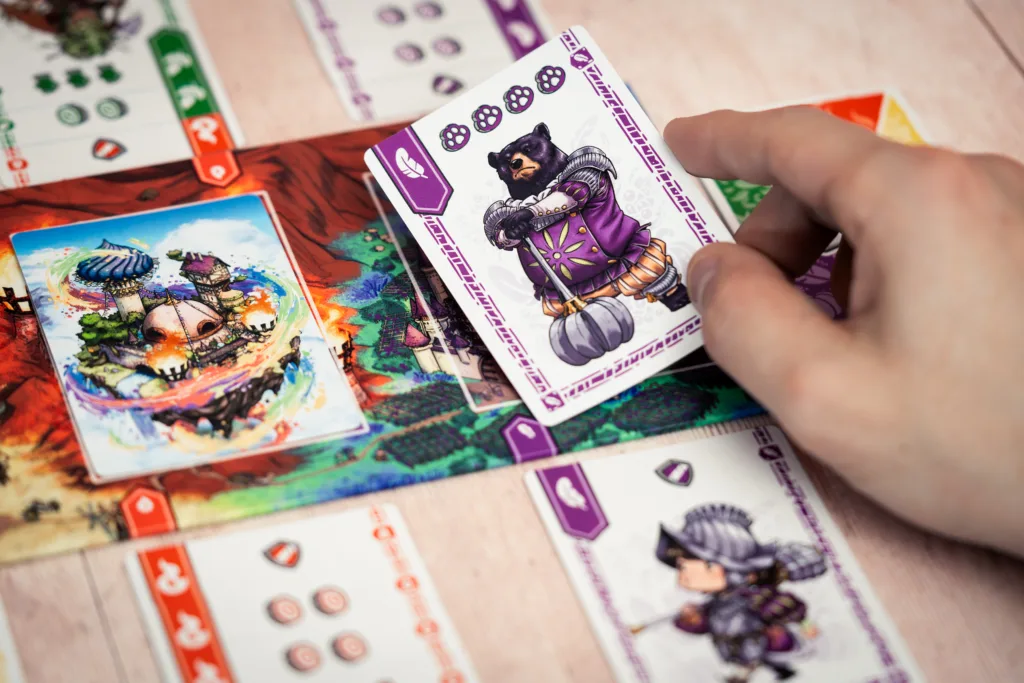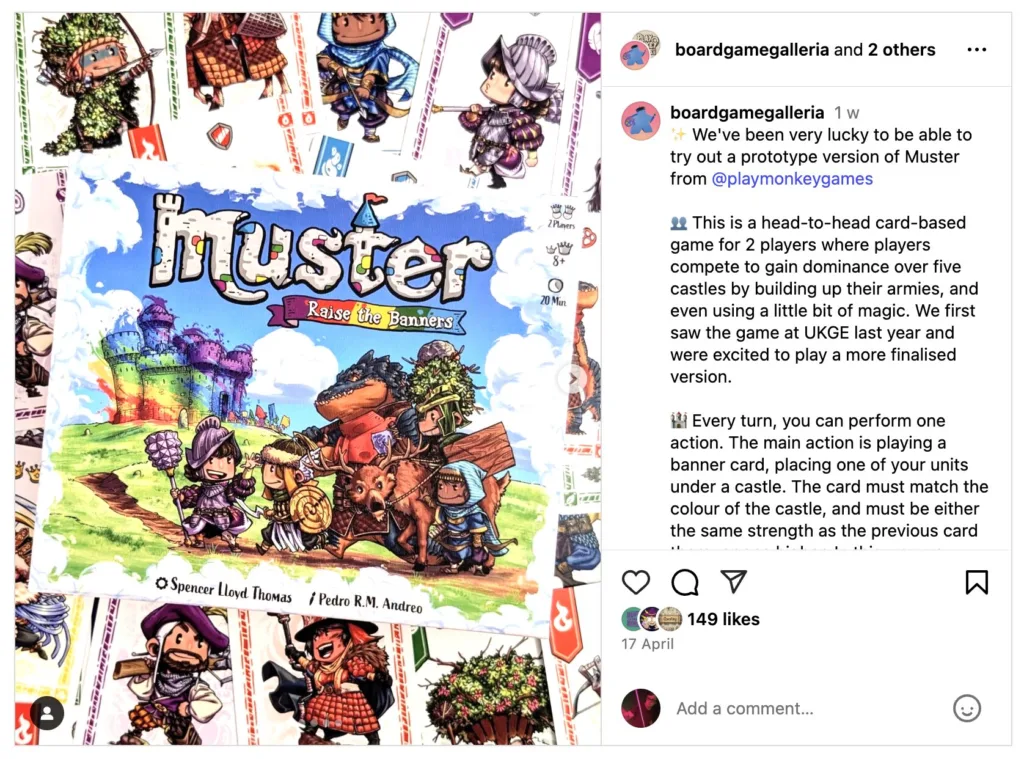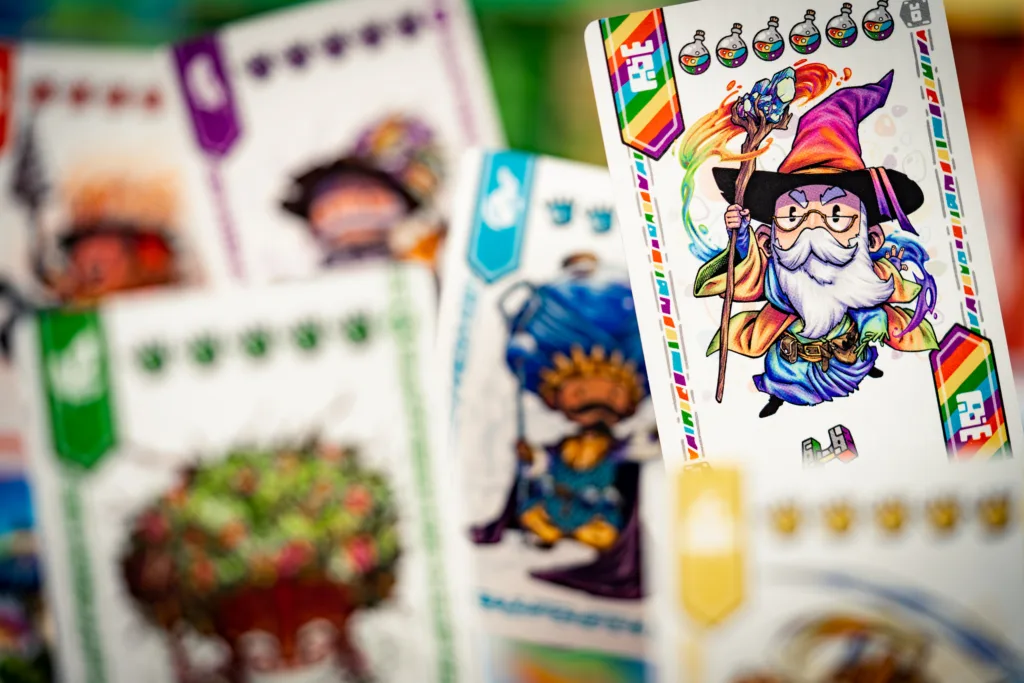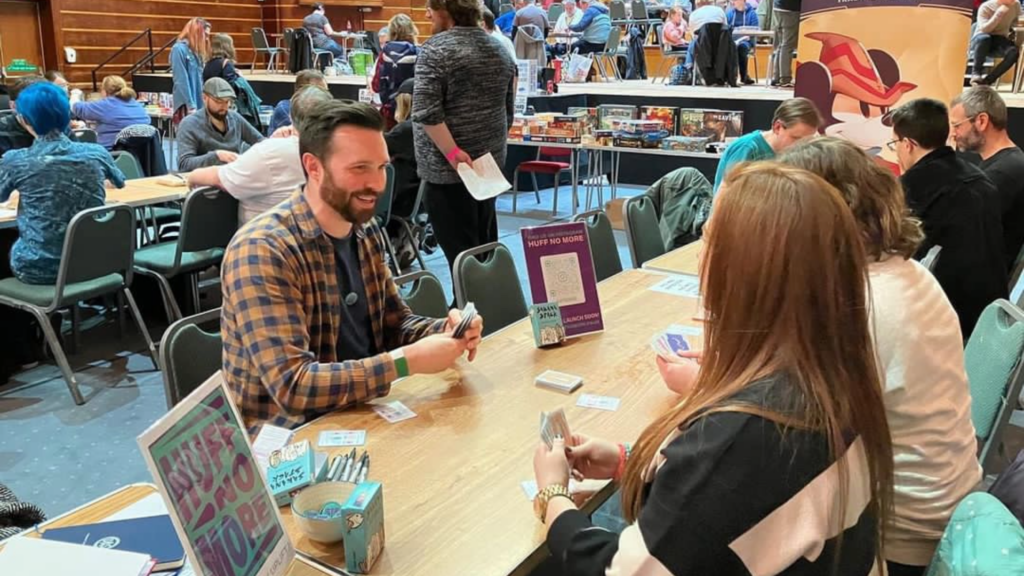Header image by Rising Dice
Welcome back, everyone! Today, we’re chatting with Spencer from Play Monkey Games, who’s just launched his first Gamefound campaign for ‘Muster: Raise the Banners’. It’s fantastic to have him back. We dive deep into the world of self-publishing – why choose crowdfunding over pitching? How do you manage the overwhelming ‘to-do’ list? And how do you handle the inevitable fear and self-doubt that comes with putting your creative work out there? Spencer shares some brilliant insights from his journey, the importance of community, and his key marketing strategies leading up to launch. Let’s get into it!
Joe: Welcome back to the blog, Play Monkey Games. Last time you were on, we were exploring the topic of making games for younger audiences. Before we dive into another wonderful conversation, can you let us know a little bit about who you are and what you’re up to?
Spencer: Hey Joe, thanks for having me back on your fantastic blog! I’m Spencer, I live in London, UK with my wife and 2 kids, and I’m the founder of Play Monkey Games – a self-publishing platform for my family-friendly game designs, with the motto ‘for primates big and small’. We’ve just launched our first crowdfunding campaign on Gamefound, for Muster: Raise the Banners, a 2-player competitive game for ages 8+! You can find it here.
Joe: Amazing, great to have you back! And people should 100% check out Muster: Raise the Banners!
With the campaign live, I’d love to talk a bit about how you’ve got to this stage. I wonder, to start, why did you choose crowdfunding over something like publisher pitching?
Spencer: Well, I’ve done a bit of publisher pitching including in person at Essen Spiel and UK Games Expo, as well as sending in game prototypes via post to various publishers, and certainly if all you want to do is game design (and you have a high pain tolerance for rejection and lengthy silences) then this is absolutely the best way to go. In fact, when I was playtesting Muster: Raise the Banners at UK Games Expo 2023, a fairly well-known and successful game designer very strongly suggested that I should reconsider any naive thoughts I had about the merits of self-publishing!
a fairly well-known and successful game designer very strongly suggested that I should reconsider any naive thoughts I had about the merits of self-publishing!
In the end, I did talk to a number of large publishers about signing the game and got some very positive feedback, but the game seemed to fall into a place of being a bit too lightweight for mid-to-heavyweight houses, many of whom enthusiastically referred me to family-friendly publishers thinking they would snap up the game, where I found they would typically demand a player count of more than 2. However, I found myself in the unique position of having had so much positive feedback on the gameplay experience that I had a high level of confidence in the market appeal, and I had a clear artistic vision on what I wanted to achieve, so I was able to lean in on c. 20 years of business experience and decided to go all-in on the self-publishing and crowdfunding route to market. And a couple of years later, here we are!
Joe: Sounds like it’s a well-thought-through decision. As you’ve pointed out, there’s so much to think about when setting up for a Kickstarter, and I’d like us to explore that in this blog post. But first, when you step back and look at all the ‘to-dos’, how do you prevent yourself from drowning in the lists?
Spencer: You’ve hit the nail on the head (and perhaps a nerve) with the at times overwhelming list of ‘to-dos’, but one advantage to self-publishing is that there are so many amazing resources out there and, as the industry is basically running on the fumes of creative passion, people tend to be incredibly generous with their advice.
As the industry is basically running on the fumes of creative passion, people tend to be incredibly generous with their advice.
Don’t know how to commission an artist and draft up a contract? There’s a detailed blog post for that. Not sure how to build up a social media following? YouTube guide. Unclear if your ad format is hitting the mark? Poll a group of like-minded Instagrammers… let’s say @boardgameprotohype for example?
I think having a punch list of the ‘next thing’ on the horizon helps – whether that be finalising artwork, setting up a website, incorporating a company, getting quotes from manufacturers, or talking to fulfilment partners. It helps to prioritise working on what is going to have the biggest impact on the success of your project – and what that success means to you, whether that be critical acclaim, artistic expression, or financial recognition.

One thing is for sure, self-publishing is hugely time-consuming and takes away from game design time, and despite everyone telling me the same before embarking on this venture, I don’t think I quite appreciated how involved it would be. But on the plus side, I have a newfound appreciation for board game publishing in general, and self-publishers in particular.
Joe: You’re so right about the quality of support and information that’s out there. I think it takes a while for some new designers to realise that you’re not actually in this alone (if you don’t want to be). Finding the people and support across the internet and in real life is crucial to success and keeping sane!
I blogged last week about feeling the fear, and something akin to imposter syndrome, as game designers with Minor Disaster Games. Is that something that resonates with you?
Spencer: Well firstly, let me express my appreciation for what you and the @boardgameprotohype admin team do in creating a safe space for designers to ask silly questions and do organised posting – it is no mean feat, especially now with over 200 members.
I read the last blog when it came out and to say it resonated with me would be an understatement! While I fortunately don’t tend to suffer from imposter syndrome, a lot of the feelings that Kristian and Caley had like “I’m scared of people playing our game, I’m scared of people not wanting to play our game, I’m scared of us failing our Kickstarter, I’m scared of us succeeding our Kickstarter” are all things that I have felt too!
Much like when your heart rate goes up and your palms get sweaty before a big presentation, I once read that this is another way of your body telling you that what is about to happen means a lot to you, which I think is a nice way to think about it.
Much like when your heart rate goes up and your palms get sweaty before a big presentation, I once read that this is another way of your body telling you that what is about to happen means a lot to you
For me, although the titles I’m publishing under Play Monkey Games are fairly lightweight and family-friendly, I personally take game design very seriously, and to paraphrase a quote I liked from Cole Wehrle’s feature in Senet magazine: “[Designing a game] might just be the most important thing you ever do!” So of course, it’s normal to have self-doubt and experience vulnerability when putting yourself out there with something that you care deeply about, but I think as long as you are intellectually honest with yourself and take pride in your work then it can only lead to good things.
I do also tend to draw from the perspective that ‘middle-aged corporate dad with kids’ offers up – there is only so much time in your life, and I really want to leave my mark on the world in a positive way that my kids will remember, so if not now, when? That tends to help me overcome fears of failure, but I think everyone else will have their own motivation personal to them.
Joe: As you led up to the launch, what were the important things on your ‘to-do’ list? What ducks needed lining up?
Spencer: As you know, crowdfunding experts say that marketing is the main deciding factor for a project’s success, with pre-launch marketing being particularly important given how critical the first couple of days are to a campaign. However, what is much more subjective is what type of marketing is best for your particular project, and a self-publisher will need to make tough decisions as marketing budgets are inevitably a scarce resource.

To give some insight, for Muster: Raise the Banners I had to decide whether I wanted to allocate my finite pre-launch time and budget on a fancy video trailer, meticulous campaign page design, manufacturing expensive prototypes, building and managing a list of reviewers, creating a press kit and contacting press outlets, preview videos on YouTube hype channels, producing a ‘How to Play’ video, creating add-ons and ‘deluxification’ pledges, ad format design across multiple resolutions and media platforms, and the list goes on… I certainly learnt some lessons along the way, and believe me there are no shortage of people lining up to take money off your hands!
Believe me there are no shortage of people lining up to take money off your hands!
In the end, I decided to prioritise two things that I thought would have maximum impact:
- a snappy launch trailer that quickly conveys both the feel of the game and its core gameplay loop (example below)
- getting high-quality prototype copies circulating among the hobby review crowd.

Video trailers are probably the best way for potential backers to quickly understand whether a project is for them, and I think can have a much bigger impact than even the best-crafted static campaign page.
Meanwhile in the physical realm, manufacturing and sending out review copies is time-intensive up-front but offers great return on investment as you will get access to: (a) punchy review quotes that you can use for your campaign, (b) new audiences across a range of platforms, depending on the reach of the reviewer, (c) often fantastic and novel photography of components and gameplay (d) a tail of reviews as copies circulate over time, with minimal additional effort given reviewers typically handle the postage (NB: expect to reimburse shipping costs). Special shout-out to @ukbg_review_circle and Lana in particular, who make the review process much more organised and efficient for us here in the UK.
With all that said, only time will tell whether our marketing was effective!
A massive thank you to Spencer for sharing such honest and valuable insights into the rollercoaster world of self-publishing! It’s been brilliant hearing about the journey to launching Muster: Raise the Banners. The great news is the campaign is live on Gamefound right now and has already successfully funded – huge congratulations, Spencer! Be sure to check it out here.
Excitingly, Spencer is keeping an audio log throughout the campaign, so keep an eye out for a follow-up blog post where we’ll dive into the real-time highs and lows! If you want that post, direct to your inbox, then subscribe to the blog below…



